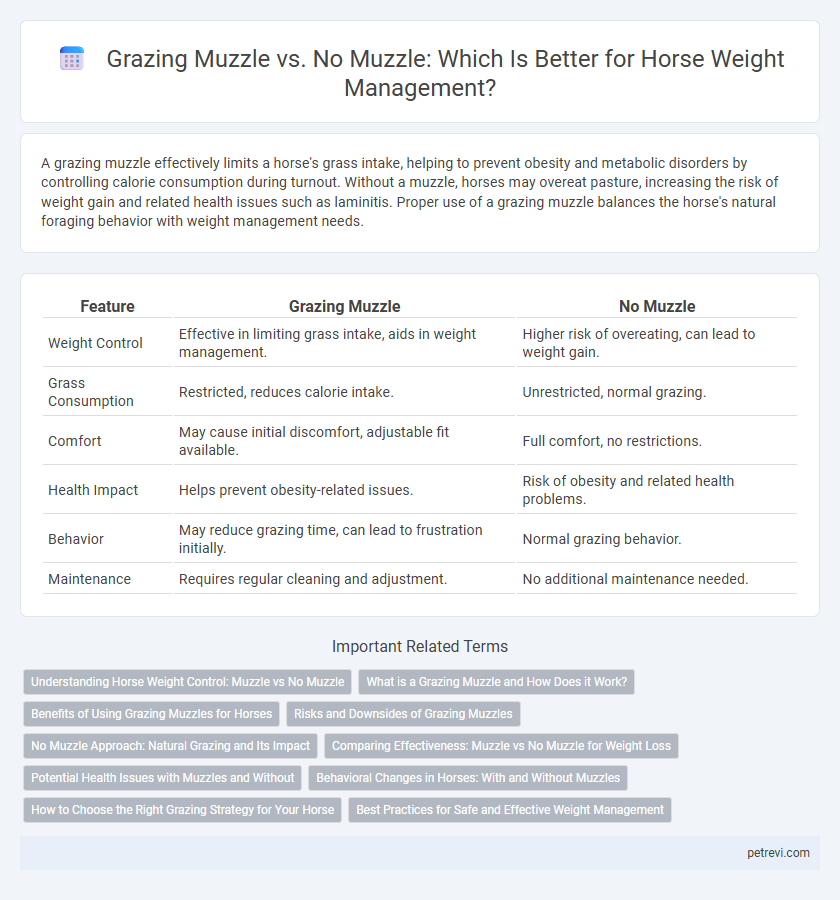A grazing muzzle effectively limits a horse's grass intake, helping to prevent obesity and metabolic disorders by controlling calorie consumption during turnout. Without a muzzle, horses may overeat pasture, increasing the risk of weight gain and related health issues such as laminitis. Proper use of a grazing muzzle balances the horse's natural foraging behavior with weight management needs.
Table of Comparison
| Feature | Grazing Muzzle | No Muzzle |
|---|---|---|
| Weight Control | Effective in limiting grass intake, aids in weight management. | Higher risk of overeating, can lead to weight gain. |
| Grass Consumption | Restricted, reduces calorie intake. | Unrestricted, normal grazing. |
| Comfort | May cause initial discomfort, adjustable fit available. | Full comfort, no restrictions. |
| Health Impact | Helps prevent obesity-related issues. | Risk of obesity and related health problems. |
| Behavior | May reduce grazing time, can lead to frustration initially. | Normal grazing behavior. |
| Maintenance | Requires regular cleaning and adjustment. | No additional maintenance needed. |
Understanding Horse Weight Control: Muzzle vs No Muzzle
Horse weight control hinges on balancing forage intake and exercise, with grazing muzzles limiting access to pasture while allowing natural behavior. Horses without muzzles often consume excess calories from rich pasture, increasing obesity risk and metabolic disorders like laminitis. Using a grazing muzzle effectively reduces calorie intake by 50-80%, aiding weight management without severely restricting grazing time or social interaction.
What is a Grazing Muzzle and How Does it Work?
A grazing muzzle is a specialized device designed to limit a horse's grass intake without restricting water or hay consumption, aiding in weight control and preventing obesity-related health issues such as laminitis. It works by covering the horse's mouth with a durable mesh or nylon material that has a small opening, allowing the horse to nibble but significantly reducing the amount of pasture ingested. This controlled grazing helps maintain optimal weight while allowing horses to enjoy turnout and natural foraging behavior.
Benefits of Using Grazing Muzzles for Horses
Grazing muzzles effectively limit forage intake, helping horses manage weight without restricting turnout time or natural grazing behaviors. Using a grazing muzzle reduces the risk of obesity-related conditions such as laminitis by controlling calorie consumption while allowing for social interaction and mental stimulation. This tool supports balanced nutrition and promotes overall equine health, especially for horses prone to overeating or metabolic disorders.
Risks and Downsides of Grazing Muzzles
Grazing muzzles can help control a horse's weight by limiting forage intake but carry risks such as restricted breathing, skin irritation, and stress from prolonged use. Improper fit or extended wear may lead to sores, behavioral issues, and compromised hydration if the horse struggles to drink. Monitoring and regular adjustment are essential to minimize these downsides while using a grazing muzzle.
No Muzzle Approach: Natural Grazing and Its Impact
Allowing horses to graze without a muzzle promotes natural foraging behavior, which supports mental well-being and social interaction in pasture settings. While continuous grazing can increase caloric intake and risk of weight gain, implementing controlled grazing schedules and providing low-calorie forage help maintain optimal body condition. Natural grazing without a muzzle enhances digestive health by encouraging slow, steady intake and effective saliva production.
Comparing Effectiveness: Muzzle vs No Muzzle for Weight Loss
Using a grazing muzzle significantly reduces a horse's forage intake by limiting mouthfuls, which directly contributes to effective weight loss compared to no muzzle use. Horses without a grazing muzzle often consume more pasture calories, increasing the risk of obesity and metabolic complications such as laminitis. Studies show that grazing muzzles can decrease grazing time by up to 80%, effectively controlling caloric intake and promoting sustainable weight management.
Potential Health Issues with Muzzles and Without
Using a grazing muzzle can help control a horse's weight by limiting grass intake but may increase the risk of stress, skin irritation, and potential respiratory issues due to restricted airflow. Without a muzzle, horses have unrestricted grazing, which can lead to obesity, laminitis, and metabolic disorders like insulin resistance. Proper monitoring and balanced nutrition are essential to mitigate health problems regardless of muzzle use.
Behavioral Changes in Horses: With and Without Muzzles
Horses wearing grazing muzzles exhibit reduced grazing time and intake, leading to slower weight gain and improved weight management. Behavioral changes include increased frustration and more frequent attempts to remove the muzzle, while horses without muzzles graze freely, often resulting in overeating and potential obesity. Monitoring these behavioral differences is crucial for optimizing weight control strategies and maintaining equine welfare.
How to Choose the Right Grazing Strategy for Your Horse
Choosing the right grazing strategy for your horse depends on factors such as its weight, metabolism, pasture quality, and exercise routine. Grazing muzzles effectively limit grass intake, reducing calorie consumption without restricting the time spent grazing, which helps prevent obesity in easy keepers. Horses without muzzles may require monitored grazing times and controlled pasture access to avoid excessive weight gain, making individualized management crucial for maintaining optimal body condition.
Best Practices for Safe and Effective Weight Management
Using a grazing muzzle helps limit a horse's grass intake, effectively controlling weight while preventing overeating and laminitis. For safe and effective weight management, regularly monitor the horse's body condition score and adjust grazing time accordingly, ensuring adequate nutrient intake without excessive calories. Combine grazing muzzles with balanced forage and controlled exercise to maintain optimal health and prevent obesity-related complications.
Grazing Muzzle vs No Muzzle for Horse Weight Control Infographic

 petrevi.com
petrevi.com